|
|
IL LADRO DI BAGDAD
(The Thief of Bagdad)
1924, regia di Raoul Walsh
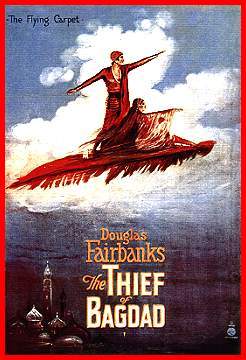
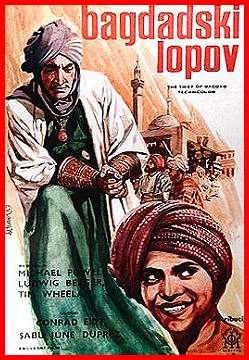
Scheda: Nazione: USA - Produzione: Douglas Fairbanks Pictures - Distribuzione: Mondadori Video, Kino International, Circulo Digital, Grapevine Video, Stokey Video, United Artists - Soggetto: Douglas Fairbanks (come Elton Thomas), da un racconto delle Mille e una notte - Sceneggiatura: Douglas Fairbanks, Lotta Woods - Fotografia: Arthur Edesoni - Montaggio: William Nolan - Scenografia: William Cameron Menzies - Costumi: Mitchell Leisen - Effetti speciali: Hampton Del Ruth - Formato: B.N., muto - Durata: 140' (155').
Cast: Douglas Fairbanks, Snitz Edwards, Charles Belcher, Julanne Johnston, Sojin, Anna May Wong, Brandon Hurst, Tote Du Crow, Noble Johnson, Sam Baker.
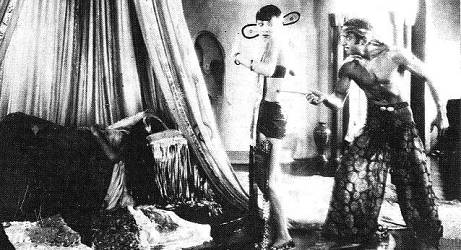
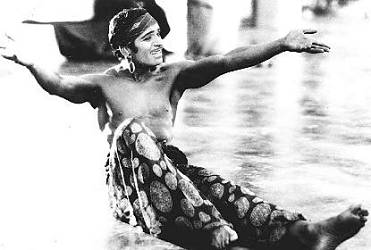
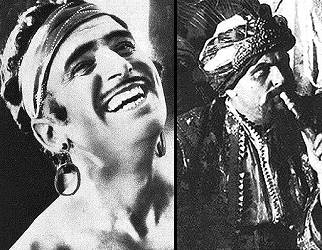
![]() Trama e commenti:
cinematografo.it
-
mymovies.it
-
pellicolerovinate.blogosfere.it -
trovacinema.repubblica.itt: «Nell'antica
Bagdad un giovane ladro, mani leste e testa fine, aiuta il Sultano, detronizzato
dal malvagio Gran Visir, a riconquistare il trono. Celebre versione muta di un
racconto delle Mille e una notte nata dall'incontro felice tra due grandi
personalità del muto, tra l'energia narrativa di Walsh e l'ilare atletismo di
Fairbanks: dinamismo, umorismo, esotismo, erotismo. Come film di Fairbanks
(1883-1939) gli sono preferibili, forse,
Robin Hood (1922) o The Gaucho
(1928) perché l'ambientazione favolosa e il fasto cinematografico si
sovrappongono qua e là al personaggio; come film di Walsh (1892-1980) è un punto
d'arrivo, notevole per l'entusiasmo con cui il giovane regista si lanciò nel
gioco della sperimentazione linguistica per far coincidere la magia araba con
quella del cinema».
Trama e commenti:
cinematografo.it
-
mymovies.it
-
pellicolerovinate.blogosfere.it -
trovacinema.repubblica.itt: «Nell'antica
Bagdad un giovane ladro, mani leste e testa fine, aiuta il Sultano, detronizzato
dal malvagio Gran Visir, a riconquistare il trono. Celebre versione muta di un
racconto delle Mille e una notte nata dall'incontro felice tra due grandi
personalità del muto, tra l'energia narrativa di Walsh e l'ilare atletismo di
Fairbanks: dinamismo, umorismo, esotismo, erotismo. Come film di Fairbanks
(1883-1939) gli sono preferibili, forse,
Robin Hood (1922) o The Gaucho
(1928) perché l'ambientazione favolosa e il fasto cinematografico si
sovrappongono qua e là al personaggio; come film di Walsh (1892-1980) è un punto
d'arrivo, notevole per l'entusiasmo con cui il giovane regista si lanciò nel
gioco della sperimentazione linguistica per far coincidere la magia araba con
quella del cinema».
![]() Plot Summary, Synopsis, Review:
silentera.com -
en.wikipedia.org -
entertainment.msn.com -
tvguide.com
-
movies.yahoo.com -
IMDb -
allmovie.com:
«Douglas Fairbanks is at his most graceful and charismatic in one of the
classic silent films of the 1920s. As the thief of Baghdad, his movements are
dance-like -- nothing like the athletics he performed in most of his other films.
In this Arabian take, the thief ignores the holy teachings and sneaks into the
palace of the Caliph (Brandon Hurst). All thoughts of robbery slip away, however,
when he sees the beautiful princess (Julanne Johnston). Princes have come from
many faraway lands to win the princess' hand (and it's amusing to watch her face
growing ever more alarmed at their arrival, because each one is uglier than the
last). The thief disguises himself as a prince and the princess falls in love
with him. After having a pang of conscience, the thief confesses all to the Holy
Man (Charles Belcher), who sends him to find a magic chest. He braves many
obstacles to get it, and when he returns he discovers that the Mongol Prince (Sojin)
has taken over the city. Using the chest, the reformed thief creates armies of
men out of nothingness and recaptures the city. He then uses the cloak of
invisibility to spirit the princess away on a magic carpet. Fairbanks stole some
of the special effects for his film from Fritz Lang's
Der Müde Tod, which he had purchased
for American distribution. The Thief of Baghdad, with its look of
unrealistic beauty (courtesy of art director William Cameron Menzies), was not
fully appreciated in its day. Because of its huge cost (two million dollars -- a
real fortune in those days), it made little money. After that, Fairbanks stuck
closer to the swashbuckling persona he felt his audience wanted. Available now
on DVD, the remastered film features a new score by Carl Davis» (Janiss
Garza).
Plot Summary, Synopsis, Review:
silentera.com -
en.wikipedia.org -
entertainment.msn.com -
tvguide.com
-
movies.yahoo.com -
IMDb -
allmovie.com:
«Douglas Fairbanks is at his most graceful and charismatic in one of the
classic silent films of the 1920s. As the thief of Baghdad, his movements are
dance-like -- nothing like the athletics he performed in most of his other films.
In this Arabian take, the thief ignores the holy teachings and sneaks into the
palace of the Caliph (Brandon Hurst). All thoughts of robbery slip away, however,
when he sees the beautiful princess (Julanne Johnston). Princes have come from
many faraway lands to win the princess' hand (and it's amusing to watch her face
growing ever more alarmed at their arrival, because each one is uglier than the
last). The thief disguises himself as a prince and the princess falls in love
with him. After having a pang of conscience, the thief confesses all to the Holy
Man (Charles Belcher), who sends him to find a magic chest. He braves many
obstacles to get it, and when he returns he discovers that the Mongol Prince (Sojin)
has taken over the city. Using the chest, the reformed thief creates armies of
men out of nothingness and recaptures the city. He then uses the cloak of
invisibility to spirit the princess away on a magic carpet. Fairbanks stole some
of the special effects for his film from Fritz Lang's
Der Müde Tod, which he had purchased
for American distribution. The Thief of Baghdad, with its look of
unrealistic beauty (courtesy of art director William Cameron Menzies), was not
fully appreciated in its day. Because of its huge cost (two million dollars -- a
real fortune in those days), it made little money. After that, Fairbanks stuck
closer to the swashbuckling persona he felt his audience wanted. Available now
on DVD, the remastered film features a new score by Carl Davis» (Janiss
Garza).
![]() Approfondimenti: Movie
Review
Approfondimenti: Movie
Review